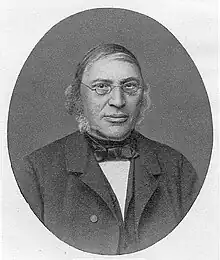Karl Lehrs
Karl Ludwig Lehrs (January 14, 1802 – June 9, 1878), was a German classical scholar.

Karl Lehrs
Born at Königsberg, he was Jewish, but in 1822 he converted to Christianity. In 1845 he was appointed professor of ancient Greek philology at Königsberg University, a post he held until his death.
Work
His most important works are:
- De Aristarchi Studiis Homericis (1833), which laid a new foundation for Homeric exegesis (on the Aristarchean lines of explaining Homer from the text itself) and textual criticism.
- Quaestiones Epicae (1837).
- De Asclepiade Myrleano (1845).
- Herodiani Scripta Tria emendatiora. Accedunt Analecta (1848).[1]
- Populäre Aufsätze aus dem Altertum (1856, Second much enlarged edition, 1875), his best known work.
- Horatius Flaccus (1869), in which, on aesthetic grounds, he rejected many of the odes as spurious.
- Die Pindarscholien (1873).
Lehrs was a man of decided opinions; his enthusiasm for everything Greek caused him to insist on the undivided authorship of the Iliad; comparative mythology and the symbolical interpretation of myths he regarded as a species of sacrilege.
Notes
- The three treatises which are the object of this study are Περὶ μονήρους λέξεως, Περὶ Ἰλιακῆς προσωιδίας, and Περὶ διχρόνων.
References
- This article incorporates text from a publication now in the public domain: Chisholm, Hugh, ed. (1911). "Lehrs, Karl". Encyclopædia Britannica. Vol. 16 (11th ed.). Cambridge University Press. p. 384.
This article is issued from Wikipedia. The text is licensed under Creative Commons - Attribution - Sharealike. Additional terms may apply for the media files.